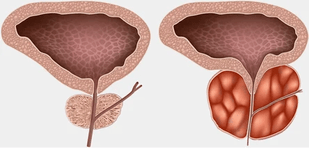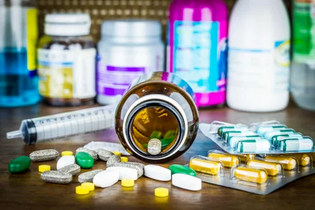
In the treatment of prostatitis, drug therapy is most often prescribed. Along the way, patients should take medications from various categories. Some aim to eliminate the symptoms that cause discomfort, while others deliberately act directly on the affected glands, eliminating the most important thing - the cause. At the same time, drugs differ in the strength of their effects, as some aim to eliminate the acute, while others resist chronic. Let's take a look at the most popular drugs used in the treatment of prostate inflammation.
Types of drugs for prostatitis
All medications prescribed by the attending physician can be roughly divided into several categories according to the method of administration:
- Tablets and capsules- taken orally, absorbed moderately by the body, if the capsule, absorption occurs faster, as all components achieve their purpose after a short time after the gelatin shell dissolves.
- Injections- these can be liquid preparations and powders, which are then diluted in working fluids, usually anesthetics, given intramuscularly or intravenously, and the effects can be seen after a few minutes. . .
- Rectal suppositories (suppositories)- has anti-inflammatory, antibacterial and analgesic effects, is given to the patient into the rectum while he is on his side, and in this position he needs to spend about half an hour until medicationit is completely soluble and absorbed.
- Installation- a group of drugs that have a maximum positive effect only if they enter directly into the affected area of the prostate gland, this method is used in a hospital setting, since the introduction is done through the urethra.
- Microclysters- as a rule, these include non-medicinal drugs, for example, herbal decoctions, they can not replace drug therapy, but can be a good remedy for pain relief or prevention.

It should be noted that several types of drugs can be sold in several forms at once, such as tablets and suppositories, therefore the attending physician must demonstrate this feature without fail.
The most popular medicine for the treatment of prostatitis
Treatment of prostatitis with medications is a rather complicated procedure that requires the doctor to choose the right medication that can not only relieve pain and eliminate other symptoms with manifestations, but also help eliminate the cause of the disease. The disease itself can also have different origins, manifest itself in acute or chronic form, and cause a variety of discomfort for the patient, limiting him in natural affairs and causing complete infertility.
Classic tablets, intramuscular injections and suppositories for rectal administration can be used in the treatment of prostatitis. The choice of drug directly depends on the urgent need for delivery of its components to the affected organ.
Extras
The treatment of prostatitis is not limited to a list of some medications. Specialists can also use other types of drugs from different categories.
Fluoroquinolones
Fluoroquinolones is an antibacterial drug used in the treatment of original prostatitis tuberculosis. These funds are used complexly, and patients can undergo a course consisting of four or more medications at once.
Cephalosporins
Cephalosporins are antimicrobial drugs that target specific types of bacteria.
Such drugs can be a broad and directed spectrum of action, and the need to use this drug or the drug directly depends on the form of the disease and its cause.
Macrolides
Macrolides are rarely used in the treatment of prostatitis, as they are intended to fight certain types of bacteria, such as mycoplasm and chlamydia. By the way, diseases like chlamydia are often accompanied by prostatitis, so doctors prescribe several tests at once to identify problems with the prostate gland at an early stage.
In the manifestation of acute prostatitis, the attending physician may prescribe several drugs from different categories at once. This approach allows you to deal with the symptoms and the disease effectively.
Analgesics
A large number of analgesics are prescribed in the presence of acute pain syndrome, which is an integral companion of chronic prostatitis, but more often worsens. The use of drugs belonging to this group outside the framework of drug therapy aimed at eliminating the disease is not recommended at all, because the body quickly becomes accustomed to them, and to achieve analgesic effect, a dose increase is required, which can have a negative effect on the liver andkidney. Analgesic courses are prescribed individually.
Alpha blockers and muscle relaxants
The main task of this group of drugs is to relieve tension from the spasmodic muscles of the bladder, urethra, and also to reduce pressure in the pelvic area. This medicine helps relieve discomfort and normalize the urinary process.
Immunomodulator
Such preparations basically contain natural ingredients, in the case of prostatitis - an extract based on the prostate gland tissue. Regardless of the drug, they all have the same principle of action, which allows:
- to slow down the inflammatory process;
- improves smooth muscle tone and bladder wall;
- to reduce the possibility of blood clots;
- improves blood circulation in the prostate gland;
- reduces prostate volume.
Immunomodulators can be used for a number of diseases, including chronic prostatitis, acute non-communicable prostatitis, prostate adenoma.
In addition, the funds are actively used for prophylactic purposes, which helps prevent the occurrence of disease or recurrence.
Vitamins and supplements
Measures included in this category can reduce inflammation, improve fluid drainage and eliminate congestion. The need for such drugs is also due to insufficient intake of beneficial nutrients into the body, especially during antibiotics.
Prostatitis is a relatively complex disease that can only be treated by a real specialist. Self-medication is not recommended, as with this approach there is a high probability of complications in the form of infertility, impotence, and even increased risk of cancer. The use of drugs for prostatitis without consulting a doctor can lead to the fact that it is impossible to get rid of the disease without surgery. In addition, self-treatment is complicated by the impossibility of making an accurate diagnosis, as this requires appropriate equipment and knowledge.
It should also be noted that most drugs used in the treatment of prostatitis are quite toxic, and some types are not suitable. If you feel pain in the pelvic area during urination, defecation or ejaculation, frequent going to the toilet and can not empty your bladder normally, do not take risks - see a doctor. Thus, you can not only prevent unwanted diseases, but you can also prevent the development of its chronic form, which you should undergo for the rest of your life. In addition, your sexual function will not be disturbed and with timely treatment, you can have a completely normal and healthy offspring.
























